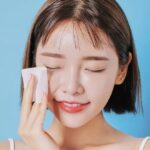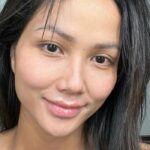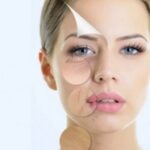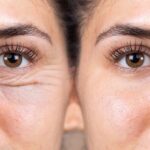Estrogen plays a crucial role in maintaining skin hydration and elasticity. As estrogen levels decline, skin loses its natural ability to retain moisture, leading to dryness, flaking, and the formation of wrinkles. This hormonal imbalance not only affects the skin but also takes a toll on hair, making it brittle, prone to breakage, and lackluster.
Here are the most common changes people may experience with their skin and hair during menopause, along with solutions to achieve youthful-looking skin and healthier hair:
1 Sagging Skin and Loss of Volume
Estrogen is a type of hormone that helps keep skin firm and elastic. It acts as a catalyst, stimulating the production of collagen, a protein that gives our skin its structure and elasticity.
When estrogen levels dip, collagen production slows down, resulting in a deficiency. Skin lacking collagen becomes less elastic, dull, and prone to wrinkles.
To counter this, many turn to collagen supplements or skincare products. Additionally, regular facial massages and the use of appropriate moisturizers can stimulate the natural production of collagen in the skin, improving elasticity and firmness.
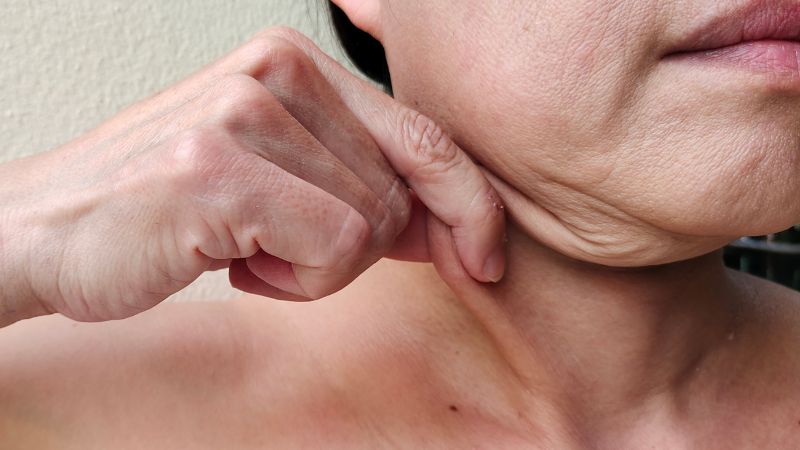 Sagging skin with loss of volume
Sagging skin with loss of volume
2 Dark Spots and Age Spots
Menopause is often accompanied by the appearance of brown spots, freckles, and age spots on the skin. To improve skin discoloration, methods such as using skin-lightening creams, chemical peels, or laser treatments can help fade pigmentation, enhance radiance, and impart a youthful appearance.
These methods work by boosting cell turnover, sloughing off dead skin cells, reducing pigmentation, and stimulating collagen production.
Tretinoin, a derivative of vitamin A, is a commonly used ingredient in treating pigmentation issues. However, consulting a dermatologist before opting for any of these methods is advisable to ensure optimal results and safety.
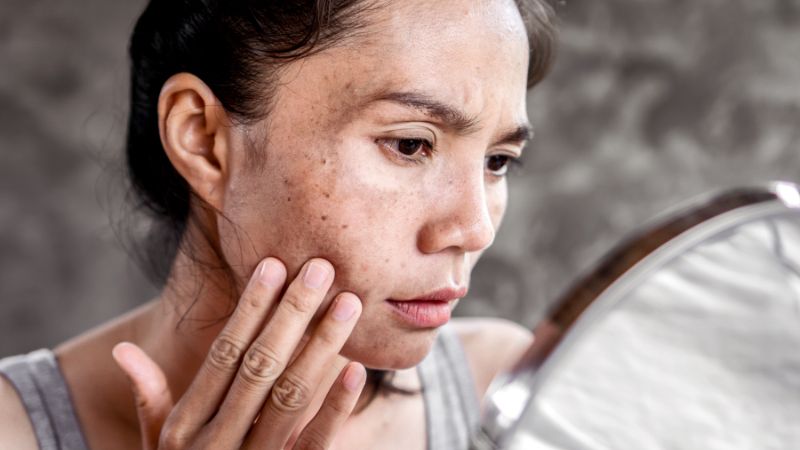 Dark spots and age spots
Dark spots and age spots
3 Dry, Flaky, and Itchy Skin
To improve dry, flaky skin commonly associated with menopause, you can adopt simple at-home skincare routines.
Firstly, opt for gentle, soap-free cleansers to wash your face without causing irritation. Next, moisturize regularly with products containing hyaluronic acid, a natural humectant, to plump and smoothen the skin.
Additionally, serums and creams containing antioxidants like vitamin C and E will shield your skin from free radical damage and ward off signs of aging. Steer clear of fragranced, colored, or alcoholic products to minimize the risk of skin irritation.
Lastly, opt for warm, instead of hot, showers and moisturize immediately afterward to lock in moisture. If your skin doesn’t improve or shows signs of abnormality, such as redness or rashes, consult a dermatologist for personalized advice and treatment.
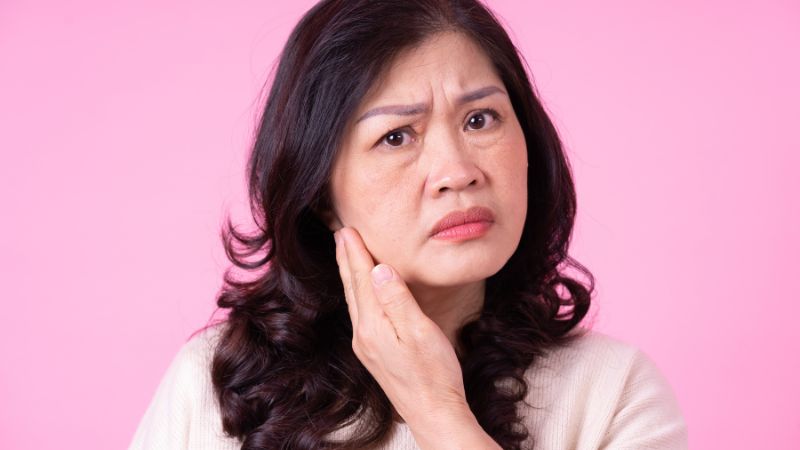 Dry, flaky, and itchy skin
Dry, flaky, and itchy skin
4 Acne
Acne is not exclusive to puberty; many women experience it during menopause due to fluctuating estrogen levels. Hormonal shifts during this time can cause an imbalance, stimulating the sebaceous glands to produce more oil, which can lead to acne.
When facing post-menopausal acne, start by using gentle cleansers containing salicylic acid to purify the skin without stripping it. Salicylic acid unclogs pores, exfoliates, and calms inflammation, helping to alleviate acne.
However, if over-the-counter skincare products don’t yield results, consult a dermatologist for prescription medication.
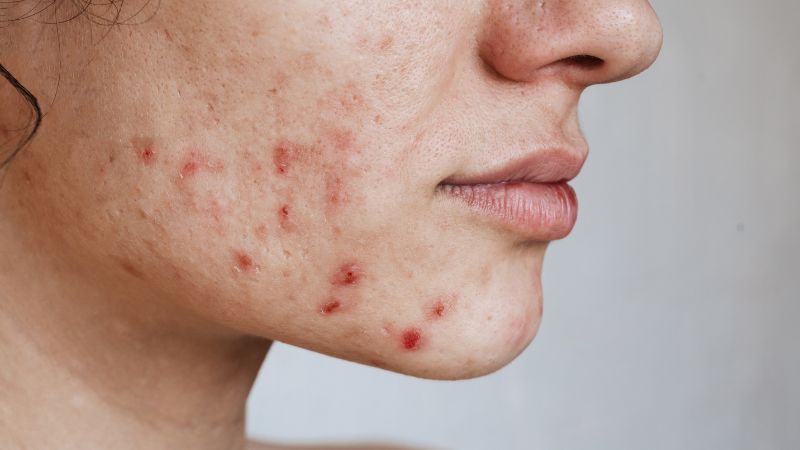 Acne
Acne
5 Unwanted Facial Hair
Hormonal fluctuations, especially during menopause, can lead to thicker and more noticeable facial hair. Temporary methods such as plucking, waxing, or using depilatory creams can be employed to remove unwanted hair. However, these methods only offer a temporary solution, as the hair will grow back after a while.
For a more permanent solution, consider hair removal techniques like electrolysis or laser hair removal. Electrolysis is a method that involves destroying the hair follicle, but it requires a skilled technician. Laser hair removal is also popular, but its effectiveness depends on hair color, as darker hair absorbs laser light better.
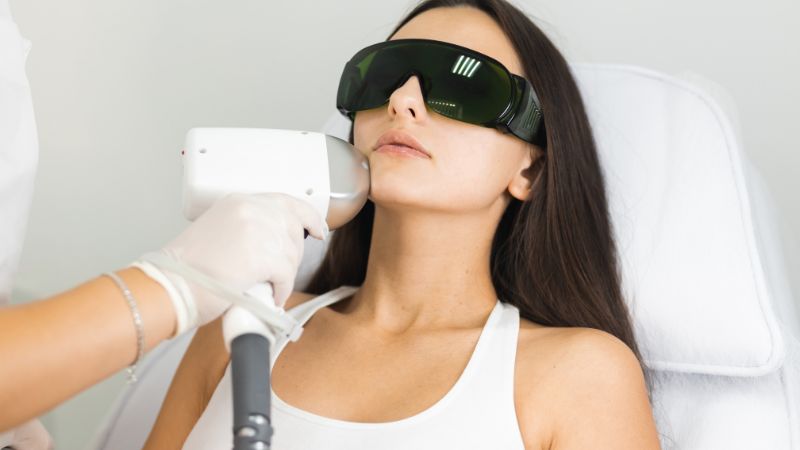 Unwanted facial hair
Unwanted facial hair
6 Hair Loss
As menopause sets in, declining estrogen levels can result in thinner hair that is more prone to breakage and lacks luster. Other factors like stress, nutritional deficiencies, and overuse of hair care chemicals can also contribute to hair loss.
Adapting a suitable hair care routine can help improve this condition. For dry scalps, opt for moisturizing shampoos and reduce the frequency of washing. Conversely, if your scalp is oily, you may need to wash your hair more often to remove excess oil.
Androgenic alopecia, a common type of hair loss in both men and women, often presents itself in middle age and later years, characterized by gradual thinning and bald patches.
Over-the-counter products containing minoxidil may help stimulate hair growth and slow hair loss. However, if you notice any abnormal symptoms, such as distinct circular bald spots, hair loss accompanied by itching, burning, or pain, pimples on the scalp, hair loss in patches, or rashes, consult a dermatologist for a proper diagnosis and treatment plan.
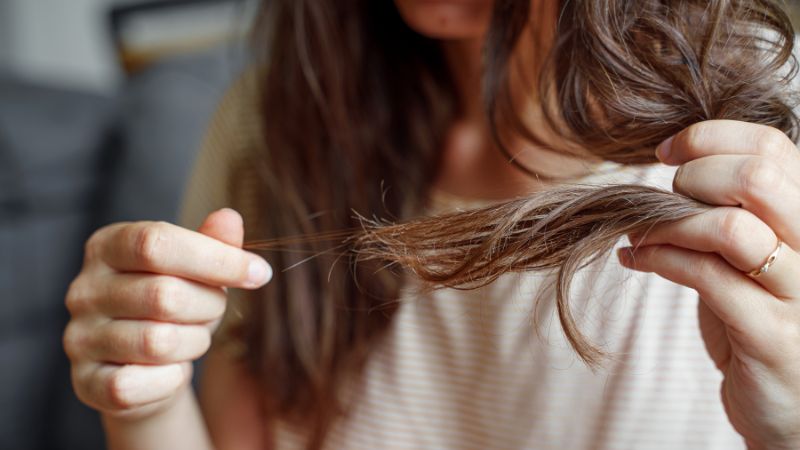 Hair loss
Hair loss
7 Sun Protection
Sunscreen is a non-negotiable step in your daily skincare routine, safeguarding your skin from the detrimental effects of UV rays all year round.
UVA rays penetrate deep into the skin, causing premature aging, while UVB rays are responsible for sunburns and heighten the risk of skin cancer. Regular sunscreen use helps prevent early signs of aging like wrinkles and age spots and significantly lowers the chances of developing skin cancer.
Choose a broad-spectrum sunscreen with an SPF of 30 or higher to shield your skin from both UVA and UVB rays. Moreover, for optimal protection, apply sunscreen 15-20 minutes before stepping out and reapply every two hours, especially after swimming, sweating, or towel-drying.
 Sun protection
Sun protection
These are some of the common skin and hair concerns during menopause and their respective solutions. Hopefully, this information will help you effectively care for your skin and hair during this life stage!
Source: Sức Khỏe Và Đời Sống Newspaper
6 Vitamin A-Rich Foods That Safely Fade Age Spots, Erase Wrinkles, and Rejuvenate Skin.
Vitamin A is a powerful tool in the fight against acne and skin aging. It helps to combat breakouts and promotes a youthful, radiant complexion. With its ability to regulate skin cell turnover, Vitamin A helps to keep pores clear and promotes a healthy, glowing complexion. It also stimulates collagen production, helping to reduce the appearance of fine lines and wrinkles, resulting in a more youthful and vibrant canvas.
The Ultimate Guide to Natural Collagen Boosting: 3 Simple Ways to Younger-Looking Skin
Collagen is a fibrous protein that plays a crucial role in the body’s connective tissues, especially the skin and hair. It is often referred to as the secret to youthful-looking skin and vibrant hair. With its ability to provide structure and elasticity, collagen is the key to maintaining a vibrant and healthy appearance.
6 Ways to Prevent Eye Wrinkles and Drastically Improve Dark Circles
It is advisable to limit sun exposure to reduce the appearance of dark circles and wrinkles. Prolonged exposure to the sun’s rays can lead to skin damage, including the formation of these undesirable skin conditions. By taking precautions and minimizing direct sunlight, you can maintain a youthful and radiant complexion.

























